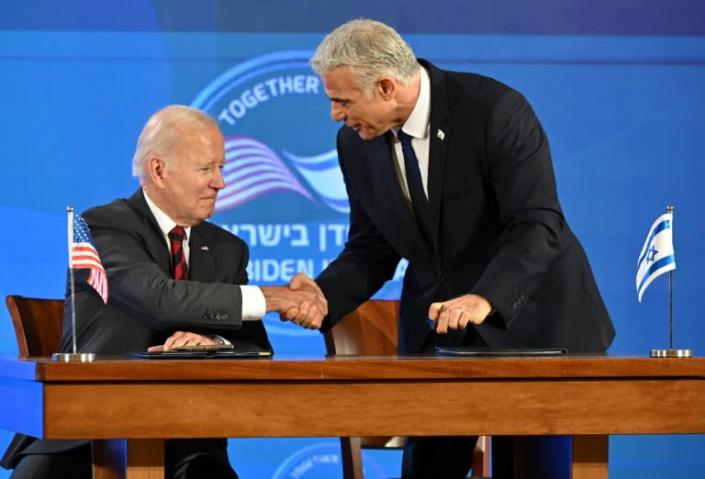
The US and Israel signed a new security pact on Thursday reinforcing their common front against Iran, as President Joe Biden pledged to use “all” American power to stop the Islamic republic from acquiring nuclear weapons.
The Jerusalem Declaration on joint security was inked by Israeli Prime Minister Yair Lapid and Biden, as the US leader was making his first trip to the Middle East as president.
It commits the United States to “never to allow Iran to acquire a nuclear weapon”, stating that it “is prepared to use all elements of its national power to ensure that outcome”.
A landmark deal that imposed curbs on Iran’s suspect nuclear programme in exchange for sanctions relief was torpedoed in 2018 by former US president Donald Trump. Efforts to revive the accord have been stalled since March.
Asked on Thursday how long the US was prepared to give those efforts, Biden said “we’re not going to wait forever” for a response from the Islamic republic.
Israel, which has the Middle East’s sole but undeclared nuclear arsenal, is staunchly opposed to the deal with Iran, which has always denied seeking the bomb.
Lapid warned “words” and “diplomacy” were not enough to thwart Iran’s alleged nuclear ambitions.
“Diplomacy will not stop them. The only thing that will stop Iran is knowing that if they continue to develop their nuclear program the free world will use force. The only way to stop them is to put a credible military threat on the table,” Lapid told reporters alongside Biden.
Iran’s ultra-conservative President Ebrahim Raisi warned Wednesday that if Biden’s trip to the Middle East was aimed at safeguarding Israel’s security, he was destined to fail.
US “efforts will not create security for the Zionists in any way,” said.
– Saudi oil –
Biden touched down in Israel on Wednesday, his 10th visit to the Jewish state since 1973, when he came as a newly elected senator.
He is scheduled to meet Israeli President Isaac Herzog and an old acquaintance, opposition leader Benjamin Netanyahu later Thursday, before holding talks with Palestinian president Mahmud Abbas in the occupied West Bank on Friday.


Air Force One will then make the first publicly acknowledged direct flight between Israel and Saudi Arabia, where Biden will meet Arab leaders.
Russia’s invasion of Ukraine will remain a top priority for the Biden administration during his regional tour, with volatile oil prices due to be the focus of talks with Saudi officials.
The president will seek to persuade Saudi Arabia to pump more oil in order to drive down prices, which have fuelled US inflation to the highest levels in decades.
– ‘Israel wants peace’ –
Since landing, Biden has repeatedly renewed Washington’s long-standing call for a two-state solution to the Israeli-Palestinian conflict, but made clear Thursday that he has no plans to reverse Trump’s controversial decision to recognise Jerusalem as Israel’s capital.
Lapid is serving as caretaker prime minister ahead of elections in November — Israel’s fifth vote in less than four years — and is therefore not expected to launch new talks with Palestinians.
But the centrist premier restated his support for a two-state solution.
“I haven’t changed my position. A two-state solution is a guarantee for a strong, democratic state of Israel, with the Jewish majority.”


“We send with you, to all the nations of the region, including of course the Palestinians, a message of peace. Israel wants peace and believes in peace. We will never yield an inch of our security,” Lapid said alongside Biden.
A US official said the administration would announce during the visit “a significant funding package” for hospitals that serve Palestinians in Israeli-annexed east Jerusalem, which Palestinians claim as their future capital.
It will also announce measures towards providing 4G internet access in the West Bank and Israeli-blockaded Gaza Strip, the US official said, addressing a persistent Palestinian frustration.
But, with Israel in political limbo ahead of its election, Biden is not expected to push Lapid for significant policy changes regarding the Palestinians.
“We are not going to come in with a top down peace plan because we don’t believe that would be the best approach,” the US official said.
But, “if the two parties are prepared to talk, we will be there,” the official added.
aue-bs/dv




